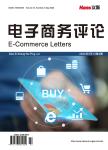基于4I理论的盲盒经济营销策略分析
Blind Box Economic Marketing Strategy Analysis Based on 4I Theory作者机构:南京林业大学人文社会科学学院江苏 南京
出 版 物:《电子商务评论》 (E-Commerce Letters)
年 卷 期:2024年第13卷第3期
页 面:6486-6491页
学科分类:0202[经济学-应用经济学] 02[经济学] 020205[经济学-产业经济学]
摘 要:盲盒起源于日本的传统福袋和扭蛋文化,是一种无法提前得知具体产品款式、具有随机属性的潮玩盒子。在新媒体消费文化的推动下,盲盒经济迅速崛起,并受到Z世代消费者的喜爱与追捧。如今,众多产业纷纷开启“盲盒+营销模式,盲盒的形式和内容也日趋多样化。本文基于4I理论框架,从趣味性、互动性、利益性和个性化四个方面,剖析盲盒经济的核心特征,探讨其在新媒体环境下的演变路径和营销模式,并指出当前盲盒经济所面临的问题和挑战,以期为盲盒文化的健康、可持续发展提供有益的参考建议。The blind box originated from the traditional Japanese Fuku bag and twisted egg culture, and is a kind of trendy play box with random properties that cannot be learned in advance of the specific product style. Driven by the new media consumption culture, the blind box economy has risen rapidly and has been loved and sought after by Generation Z consumers. Nowadays, many industries have opened the “blind box + marketing model, and the form and content of the blind box are increasingly diversified. Based on the 4I theoretical framework, this paper analyzes the core features of the blind box economy from the four aspects of interest, interactivity, profit and personalization, discusses its evolution path and marketing model under the new media environment, and points out the problems and challenges faced by the blind box economy at present, with a view to providing useful suggestions for the healthy and sustainable development of the blind box culture.



